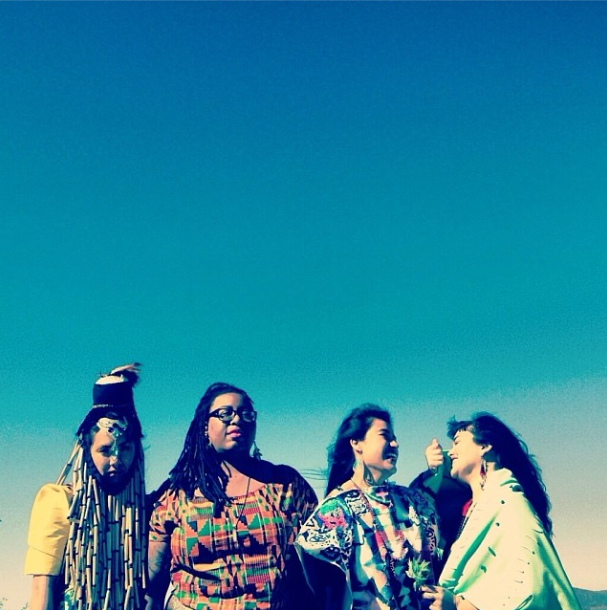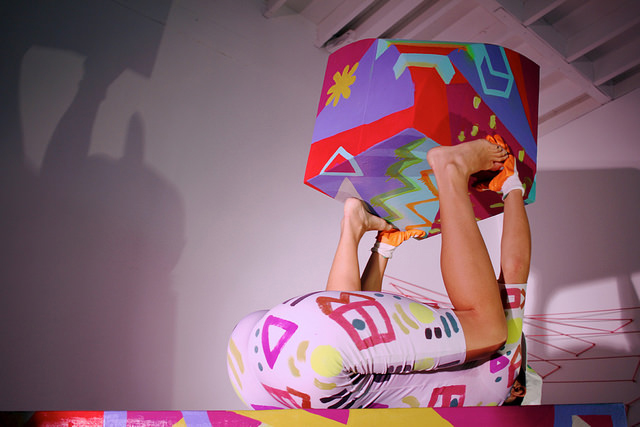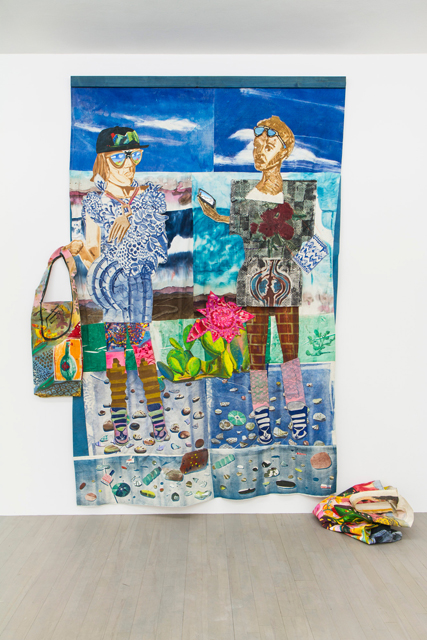Opening Thursday night in SOMArts’ main gallery, bright paintings, textiles, video screens and small wooden sculptures arranged altar-like in front of a salmon-colored wall welcome viewers to Visions Into Infinite Archives, a sprawling and thrilling group exhibition organized by the LA and Bay Area-based artists of Black Salt Collective.

The show features work by 30 artists of color, including the collaborative and individual work by Black Salt Collective members Sarah Biscarra-Dilley, Grace Rosario Perkins, Anna Luisa Petrisko and Adee Roberson. Each fabric piece, papier-mâché mask, confrontational video or sculptural assemblage in Visions represents a node in a web of relationships the organizers forged with the show’s artists. Instead of a linear or self-contained official record, the collective’s “archive as exhibition” is open, ever-expanding and deeply personal.
“The conceptual basis was to push against the finite and measurable archive that tends to represent people not in their own voices,” says Biscarra-Dilley. For Biscarra-Dilley, who is Chumash, this manifests in an intricately embroidered textile piece hung from SOMArt’s two-story-high rafters. Subtitled It took away her fear and made her strong, the work includes a portion of text Biscarra-Dilley prefers to keep untranslated, limiting general access and reserving interpretation.

Additional individual work from members of the collective appears as a sculpture and video installation by Jeepneys (Petrisko) and some times (an art project and bar run by LA-based Meghan Gordon). In a Powers of 10-esque zoom-out from a Jeepneys performance at some times last summer, SOMArts viewers see the performers watching and critiquing their own performance. The entire viewing experience takes place amidst the same brightly-painted stage furniture the performers used at some times.
As a way of “archiving” a performance, especially one deemed potentially unsuccessful, Let Me Be The One: A history of decolonized service is one of the most inventive (and generative) approaches to documentation I’ve ever seen. In a further meta moment, Jeepneys uses the entire tableau as the setting for an opening night performance.

In what’s likely to be the most controversial work in the show, Postcommodity (another multi-talented interdisciplinary artist collective) presents Gallup Motel Butchering. The four-channel video shows a Navajo woman butchering and preparing a sheep for a family feast in the incongruous space of a motel bathroom.
Similarly unflinching is Roberson’s massive wall piece, a combination of drum beats rendered as graphic patterns and images of black women killed by the police.

Across the gallery, Paula Wilson’s City Girls in the Desert, a textile work made up of screen prints, monotypes, machine and hand stitching stretches over 10 feet tall. Look closely for the embedded video screen in one figure’s hand.
Perkins’ work is sprinkled throughout the exhibition as papier-mâché masks, collaborations with her father (Olen Perkins, responsible for the wonderful knob-nosed sculpture Snake brain) and Xerox transfers affixed to the edges of the gallery’s movable walls. These vertical pieces, once united as strips of wallpaper, create a fitting metaphor for Visions Into Infinite Archives as a whole. With Perkins’ work separated, occupying what is usually unused space, it’s as if a wall opened up to reveal a multitude of vibrant histories, personal narratives and potential futures behind its façade — all emblematic of a network that deserves more attention more often.
Visions Into Infinite Archives runs Jan. 14 – Feb. 10, 2016 at SOMArts in San Francisco. For a full list of accompanying events, including an afternoon of film screenings on Jan. 30, visit somarts.org.